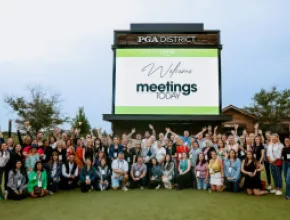
Dear Ashley, how can you make sure you don’t confuse respecting local culture with cultural appropriation?
Andres Lopez Serrato, Director of Sales, The Standard, Ibiza
Dear Andres,
It is wonderful that event and hospitality leaders are eager to authentically introduce their audiences to a destination’s cultures, practices and traditions. However, it is important to recognize that culture is complex, and there is a thin line between appropriation and appreciation.
To provide more comprehensive advice in navigating these nuances, I teamed up with Zoe Moore for this month’s column. Zoe is a Certified Diversity Practitioner (CDP) and is the hospitality industry’s leading strategist, speaker, writer and advisor for all topics centered around equity, diversity and inclusion—a perfect spot for culture to sit.
Together, we came up with these key questions to guide you in designing events that respectfully honor local cultures:
Do you understand the meaning of cultural appropriation?
Cultural appropriation is defined as the adoption, usually without acknowledgment, of cultural identity markers from subcultures or minority communities into mainstream culture by people with a relatively privileged status.
This is a heavy definition because it’s a heavy offense. Cultural appropriation is harmful because it creates an unfair unbalance. If one culture is knowingly taking from another, it is not only hurtful, but it contributes to continued oppression and exploitation, and it can perpetuate negative stereotypes and misunderstandings.
Consider the situation where fashion designer Isabel Marant used indigenous patterns unique to the Purepecha community in Mexico. The artist claimed that she wanted "to promote a craft and pay tribute to the aesthetic to which it is linked," yet never included the community in the design or approval process. This resulted in the Purepecha community feeling disrespected, exploited for the artist’s profit, and ultimately - uncompensated for their own craft. Mexico’s Mexican Culture Minister, Alejandra Frausto Guerrero, stated that the styles were used without acknowledgement, and the Mexican government has started discussions on how to tighten copyright laws to protect indigenous designs.
Without fully understanding the meaning and effects of cultural appropriation, it is easy to make some missteps (even if you have good intentions). As you start your planning process, ask yourself these questions:
- Is my intention to honor and preserve the culture?
- Am I understanding the whole story, and recognizing the dominant culture's influence on it?
- Am I making every effort to not diminish its significance?
- Am I making sure not to contribute to harmful stereotypes?
- Have I asked permission to participate and include event attendees?
- Am I welcoming locals, natives or residents?
- Am I sharing credit appropriately?
Have you answered yes to each of these? If so, you are on a positive path to cultural appreciation.
Looking for some guiding principles on how to lead more culturally sensitive destination events? Check out these four tips Ashley shared in the June Dear Ashley column.
Are you open to looking at culture through a new lens?
If you are planning an event in an unfamiliar destination, it is likely you are not aware of the local customs or practices, and that’s okay. The reality is that it’s impossible to know everything about every culture. But to truly comprehend the gravity of cultural appropriation, we need to look at it from a historical lens.
A lot of the rituals, symbols and traditions capitalized on as popular trends were once deemed evil. Ethnic groups who held onto their beliefs became outcasts, or worse, they were forced to convert. As time went on, these same practices went from being mocked to being adopted by the dominant culture as fun and cool things to do, resulting in minimizing the purpose of how it was understood, embraced and valued in the first place.
Understanding this historical lens gives us even more reason to dive deeper into learning the meanings behind the cultural elements we aim to incorporate in our events. In doing so, let’s also remember the importance of challenging deep-seated biases. This is nothing to shy away from because the truth is—we all walk through life with our own assumptions and ideas. Start by recognizing inherited social privileges and how they intersect with the lived experiences of locals.
What is your event objective: education, entertainment, engagement?
Every event has primary goals and planned takeaways; think critically about yours.
Is education a key pillar for how you are connecting your attendees to the destination?
If not, it is likely you are crossing the cultural appropriation line—even if you are including all of the unique cultural elements (decor, music, cuisine, entertainment) that represent the destination. The reality is that if you are not providing context for these symbols, you are not authentically honoring them.
In striving to educate our audiences, Zoe reminds us that historical occurrences rarely have a Hollywood ending. The romanticized versions of history that make people comfortable are often rooted in the erasure of people's identity, culture and traditions.
Here’s an example: have you attended or hosted an event in the Caribbean? Many event leaders are eager to welcome their attendees to the tropical paradise of white sandy beaches and turquoise seas; however, the story of the island natives often goes untold.
[Related: Associations Are Increasingly Emphasizing DEI]
Events in the Bahamas often include a Junkanoo-themed reception or dinner. Attendees are commonly welcomed by dancers in towering, vibrant, sequined costumes and musicians ringing cowbells and beating on goatskin drums. With all the bells and whistles, it can be a stunning, show-stopping affair.
However, there is one thing that is often overlooked: connecting attendees to the true meaning of Junkanoo. To help us better understand the symbolic history, Bahamian historian and culture expert Arlene Nash-Ferguson shared these insights:
“The festival that we call Junkanoo today was started in The Bahamas hundreds of years ago by enslaved Africans. They used three days holiday at Christmas to celebrate African heroes like Gyan Kwaw (John Canoe), as well as to reaffirm their humanity, by recreating their festivals and rituals from home. Under cover of night, they stole away to reclaim their heritage, using traditional goatskin drums, and substituting cow bells for their bells and rattles of home. In the tradition of the motherland, they decorated themselves, using whatever was available in their new environment, including eventually, paper. This tradition has come down to us as Junkanoo, now the national cultural festival of The Bahamas.”
Rarely is this rich history of Junkanoo shared with visitors. And as a result, we are missing a powerful opportunity to educate our attendees and honor the Bahamian culture.
There are easy ways to include education—before, during and after your events. Begin with researching the destination’s founding stories, symbols and customs as told by natives then try the following ideas:
- Share historical information about your event themes in pre-event messaging and materials.
- Include destination-specific trivia questions in the registration process.
- Host a pre-event virtual Q&A session with your local partners and your attendees.
- Hire a local historian to give a brief and dynamic history of the tradition being celebrated at your event.
- Mail post-event postcards with photos of the event and captions about what attendees learned.
Are you leading by listening?
As Zoe's grandma loves to say, "You have two ears and one mouth, do twice the amount of listening than you do talking."
If you lead by listening, you will be in a better position to learn. Being culturally respectful starts with being genuinely curious.
Let’s remember that planning an event is not a solo effort. Curating experiences is an enormous team-undertaking that brings together experts of all personal and professional backgrounds, skill levels and points of view to deliver an impactful gathering.
Lean on your locally-based team to start learning. Ask them to share more intimately about their culture. Some helpful questions to lead conversations like these include:
- What symbols or traditions currently best honor your culture?
- How has your history most impacted the way that locals live today?
- What do you consider the most significant holiday and how is it celebrated? Is it acceptable for visitors to take part in the celebration?
- What would you most like visitors to learn about your culture?
Connect with a few of your local partners to gain diverse perspectives.
How are you investing your event budget in the local economy?
Being culturally respectful also means finding ways to pay locals for their time, emotional labor and willingness to share themselves with your audience. Ask how you can invest time, money and resources in ways that will benefit projects that ensure communities thrive.
Some ways to invest your event budget locally are to:
- Hire local greeters to welcome attendees at the airport and provide tours.
- Host a gifting experience where local artisans are invited to introduce and sell their crafts in a marketplace.
- Organize dine-arounds at local and native-owned restaurants.
Before the big event, research the tipping culture in your host destination. While estimating gratuity may be a standard practice to extend appreciation, customs vary around the world.
Ultimately, the best way to infuse culture into your events with truth, care and respect is to learn about the destination’s history, invest in insights and involvement from your local partners, and lead your event strategy with education as a key pillar.
Continue being curious,
Ashley & Zoe
Want to get more advice on how to lead global events that honor local culture? Send your question to Ashley at @ashleyroseontheroad on Instagram or email Ashley at alawson@achieveincentives.com.







